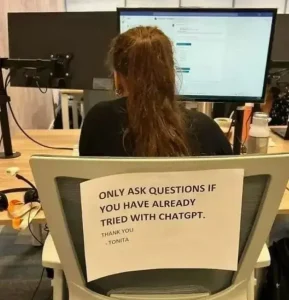
Part 1:
In the BBC video, “How AI Uses Our Drinking Water,” I believe the main point is that AI uses a huge amount of water and energy, far more than most people realize, and that the rapid growth of AI is putting pressure on local water supplies and the environment. The video explained this issue well and I also appreciated that it discussed the lack of transparency from big tech companies. One thing I hadn’t known before watching the video was how much water a single ChatGPT interaction uses. Even one prompt, just asking a basic question, uses about 1/15 of a teaspoon of water, which really adds up when you think about billions of messages being sent every day.
The main point of the article, “Companies Are Blaming AI for Layoffs. The Real Reason Will Piss You Off” by Jari Mattla is that companies are blaming AI for layoffs to avoid admitting the real reasons, such as that they over hired or want to cut costs. I think the article made this point very clearly. It used research from MIT, Oxford, and the Federal Reserve along with real examples from companies like Klarna and IBM. One thing I hadn’t known before reading the article is that many of these layoffs actually trace back to the pandemic, when companies massively over hired. Now they’re cutting those jobs but blaming AI to make it sound innovative and intentional.
The main point of the article ‘Behind the Curtain: A white-collar bloodbath’ by Jim VandeHei and Mike Allen is that AI poses a real and immediate threat to millions of white-collar jobs, especially entry-level positions, and that companies and the government are not preparing people for the speed of this shift. I think the authors made their point well; they quoted AI executives directly and gave specific examples of companies already shifting toward automation. One thing I hadn’t known before reading the article is that companies are already hesitating to fill positions because they want to see if AI can do the work first. I found that interesting.
Part 2
I used Chat GPT as my AI experiment. I learned how much the quality of the responses depends on the way I word the prompts. I found it helpful to be specific. When I asked very general questions, the answers were kind of broad, but once I gave more detailed prompts, the responses became a lot clearer and more organized. I also found that AI can compare complex ideas pretty easily, as long as I tell it exactly what I want it to focus on. That’s pretty cool.
I found the responses interesting. For example, AI didn’t just pick a side when I asked which article was more persuasive. Instead, it explained that the answer depends on what a person values. If someone prioritizes current evidence and corporate transparency, then Mattlar’s article would seem more persuasive. But if a person cares more about expert predictions and future risk assessments, then the VandeHei & Allen article might be a better pick. I liked that the AI broke it down that way instead of forcing a simple yes-or-no answer; it showed how each article could be persuasive for different reasons.
My emotional reaction was a mix of curiosity, a little bit of surprise, and also impressed with how helpful and detailed the responses were. Using AI for the assignment made me more aware of how powerful these tools are and how much they can shape the way we understand information.
Based on both articles and the AI experiment, I think we’re headed toward a future where AI is going to be a much bigger part of the workplace. Even if AI isn’t replacing most workers right now, it’s clear that companies are preparing for that possibility. I think that we are moving toward a period where entry-level jobs may become harder to access, and where workers will need to understand AI just to keep up. To manage this, the government needs to be more informed and start preparing for the workforce changes that are coming, instead of ignoring the issue. Workers also need better access to training so they can understand how AI works and how to use it. I don’t think we can stop the changes, but we can make the transition less harmful if we prepare for it now.
0 Comments